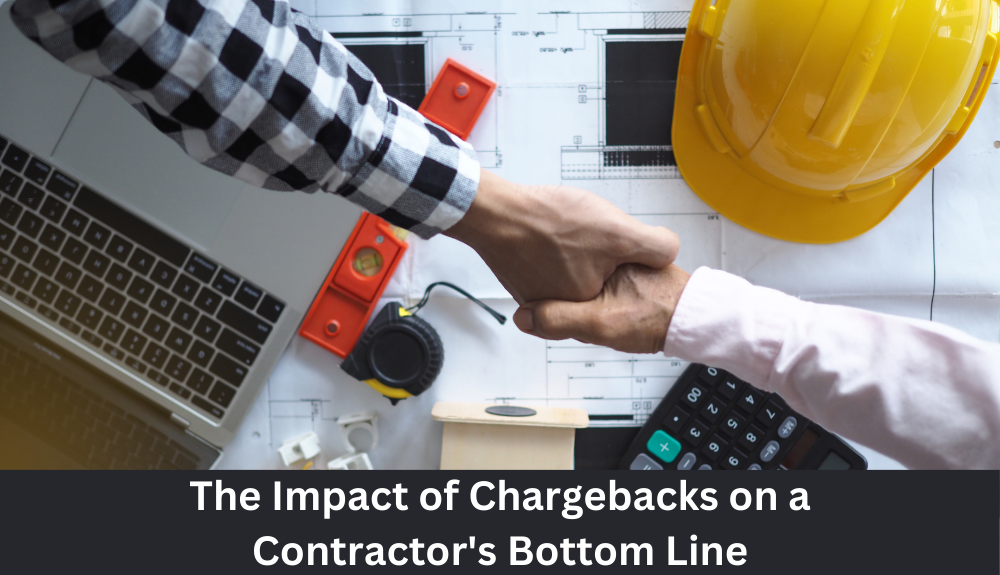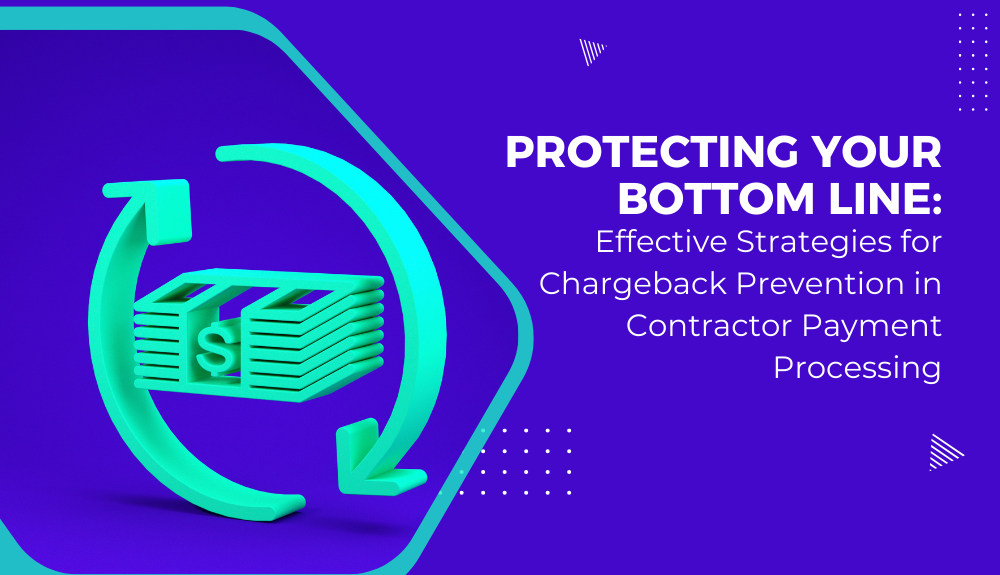Chargebacks can be a thorn in the side of contractors, causing headaches and eating away at profits. But fear not! By implementing effective strategies for prevention in contractor payment processing, you can safeguard your bottom line and keep those hard-earned dollars where they belong – in your pocket. Join us as we delve into the world of chargeback prevention and discover how you can protect your business from financial losses. Let’s dive right in!
What are Chargebacks and Why are They a Problem for Contractors?
Picture this: you’ve completed a project, delivered top-notch work, and eagerly await payment. Suddenly, out of the blue, a chargeback hits. But what exactly are chargebacks? In simple terms, they occur when a customer disputes a transaction with their bank or credit card company. For contractors, these chargebacks can spell trouble on multiple fronts.
Chargebacks can lead to revenue loss for contractors. When a dispute arises and funds are reversed, it directly impacts your bottom line. Additionally, dealing with chargebacks consumes valuable time and resources that could be better spent on growing your business or taking on new projects.
Moreover, frequent chargebacks may tarnish your reputation as a contractor. Excessive disputes can raise red flags with payment processors and potential clients alike. To maintain trust and credibility in the industry, minimizing chargebacks is crucial for contractors looking to secure long-term success in their business endeavors.
Understanding the Chargeback Process
Chargebacks can be a headache for contractors. Understanding the chargeback process is crucial to navigate this challenging aspect of payment processing. When a customer disputes a transaction, they initiate a chargeback with their bank or credit card company. This leads to funds being taken back from the contractor’s account and returned to the customer.
The chargeback process typically involves an investigation by the issuing bank or credit card company to determine the validity of the dispute. Contractors must provide evidence to defend themselves against fraudulent claims or misunderstandings. If deemed valid, the contractor loses not only the payment but also incurs additional fees.
It’s important for contractors to familiarize themselves with the specific procedures and timelines involved in responding to chargebacks promptly and effectively. Being proactive in understanding and managing chargebacks can help protect your bottom line in contractor payment processing.
The Impact of Chargebacks on a Contractor’s Bottom Line

Chargebacks can significantly impact a contractor’s bottom line by causing financial losses and disruptions in cash flow. When chargebacks occur, contractors not only lose the revenue from the disputed transactions but also incur additional fees and administrative costs associated with managing the disputes.
Moreover, chargebacks can harm a contractor’s reputation and credibility within the industry. Excessive chargebacks may lead to increased scrutiny from payment processors, higher processing fees, or even termination of merchant accounts. This can tarnish relationships with clients and hinder future business opportunities.
In addition to the direct financial implications, dealing with chargebacks consumes valuable time and resources that could be better allocated to growing the business. Contractors must invest time in disputing chargebacks, providing evidence, and communicating with customers or banks to resolve these issues promptly.
The impact of chargebacks on a contractor’s bottom line goes beyond just monetary losses—it extends to operational efficiency, customer trust, and long-term sustainability.
Strategies for Preventing Chargebacks in Contractor Payment Processing
When it comes to preventing chargebacks in contractor payment processing, implementing effective strategies is key. One crucial approach is using robust payment technology that offers advanced security features and fraud detection capabilities. By investing in reliable payment systems, contractors can reduce the risk of chargebacks stemming from unauthorized transactions or fraudulent activities.
Another vital strategy is establishing strong customer communication and dispute resolution policies. Clear communication with clients regarding billing details and project expectations can help minimize misunderstandings that could lead to disputes and ultimately, chargebacks. Additionally, having a structured process for resolving any issues promptly and amicably can prevent escalations that may result in chargeback requests.
Furthermore, conducting thorough contractor screening and verification processes before engaging in projects can be instrumental in mitigating potential risks associated with non-payment or client dissatisfaction. By vetting clients diligently and ensuring alignment on terms upfront, contractors can proactively address red flags that could later contribute to chargeback situations.
A. Using Robust Payment Technology
In the fast-paced world of contractor payment processing, utilizing robust payment technology is key to safeguarding your bottom line. By leveraging advanced digital tools and secure platforms, contractors can streamline transactions and reduce the risk of chargeback.
Robust payment technology not only facilitates efficient payments but also offers enhanced security measures to protect against fraudulent activities. From encryption protocols to multi-factor authentication, these technologies provide layers of defense against potential threats.
Moreover, incorporating features like real-time transaction monitoring and instant alerts enables contractors to promptly address any suspicious or disputed charges. This proactive approach not only minimizes the impact of chargeback but also fosters trust with clients by ensuring transparency in financial transactions.
Investing in robust payment technology is a strategic decision that can significantly benefit contractors by optimizing their payment processes and enhancing overall financial security.
B. Implementing Strong Customer Communication and Dispute Resolution Policies

Effective communication and dispute resolution policies are essential for contractors to prevent chargebacks in their payment processing. By establishing clear lines of communication with customers from the onset, contractors can address any issues promptly and avoid misunderstandings that may lead to disputes.
Ensuring that all terms and conditions are clearly outlined in contracts can help set expectations upfront, reducing the likelihood of disputes arising later on. Providing excellent customer service and being responsive to inquiries or concerns can also help build trust with clients, making them less likely to file chargeback.
In cases where disputes do occur, having a structured resolution process in place can streamline the handling of such issues. Promptly addressing customer complaints and working towards an amicable solution demonstrates professionalism and a commitment to customer satisfaction.
By implementing strong customer communication and dispute resolution policies, contractors can proactively mitigate potential chargeback risks while fostering positive relationships with their clients.
C. Conducting Thorough Contractor Screening and Verification Processes
When it comes to protecting your bottom line as a contractor, conducting thorough screening and verification processes is crucial.
By implementing stringent background checks and verifying the credentials of potential contractors before engaging in business with them, you can significantly reduce the risk of chargeback.
Make sure to verify their qualifications, licenses, insurance coverage, and past performance on similar projects. This will help ensure that you are working with reliable and trustworthy professionals who are less likely to cause payment disputes.
Additionally, establishing clear contractual agreements outlining payment terms, project scope, and dispute resolution procedures can also help mitigate the risk of chargebacks down the line.
Remember that investing time and resources in vetting your contractors upfront can ultimately save you money and protect your business from unnecessary financial losses.
